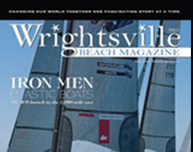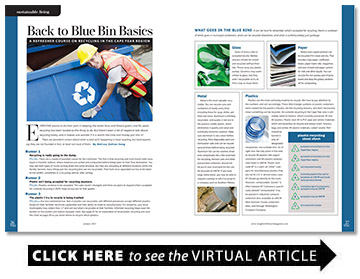Back to Blue Bin Basics
A refresher course on recycling in the Cape Fear Region
BY Melissa Sutton-Seng
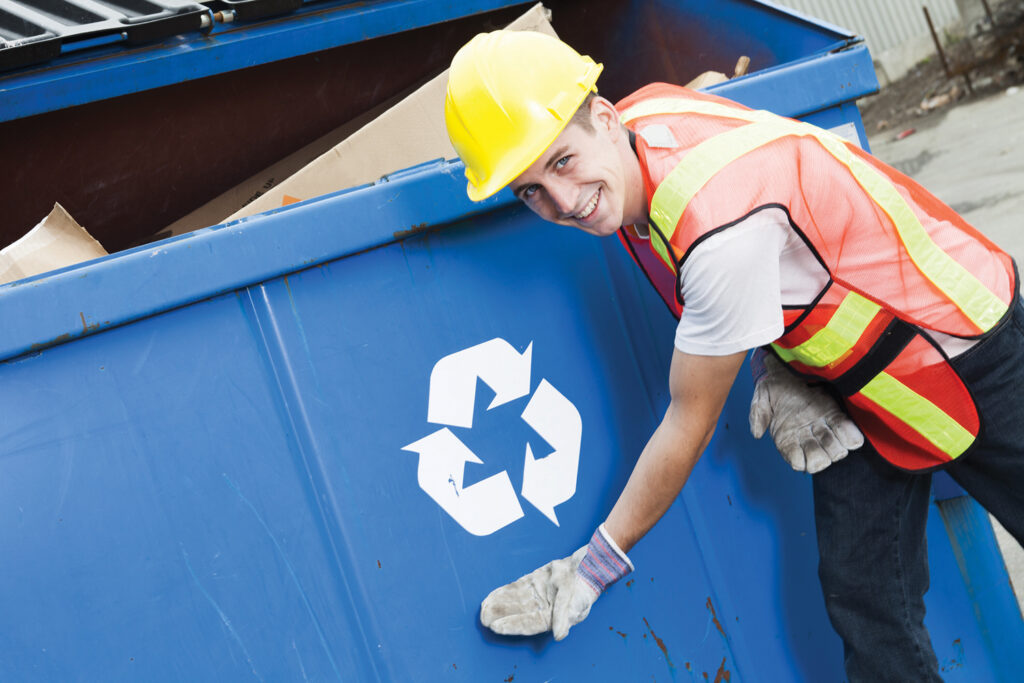
Everyone wants to do their part in keeping the water blue and forests green, and for years recycling has been touted as the thing to do. But there’s been a lot of negative talk about recycling lately, and it makes one wonder if it is worth the time and money put into it?
There are persistent rumors about what is (and isn’t) happening in local recycling, but local experts say they are not founded in fact, at least not most of them.
Rumor 1:
Recycling is really going to the dump.
False. There are a couple of possible causes for this confusion. The first is that recycling and trash trucks both carry loads to transfer stations, where materials are sorted and compacted before being taken to their final destination. You may see both types of trucks turning down the same driveway, but they are unloading at different locations within the facility. Second, many things put into recycling bins are not recyclable. That trash once separated out has to be taken to the landfill, sometimes in a recycling vehicle, after sorting.
Rumor 2:
Plastic isn’t being accepted for recycling anymore.
False. Plastics continue to be accepted. The rules haven’t changed, and there are plans to expand what’s accepted for curbside recycling in 2023. Keep an eye out for that update.
Rumor 3:
The plastic I try to recycle is being trashed.
False… but also somewhat true. Not all plastics are recyclable, and different processors accept different plastics based on their facilities’ technical capabilities and their ability to resell to manufacturers. For simplicity, your local municipality may collect Nos. 1-7 and sort out what’s recyclable at their facilities. Informed recycling helps ease the burden on the system and reduce taxpayer costs. See page 27 for an explanation of local plastic recycling and save the chart on page 29 so you know where to recycle which plastics.
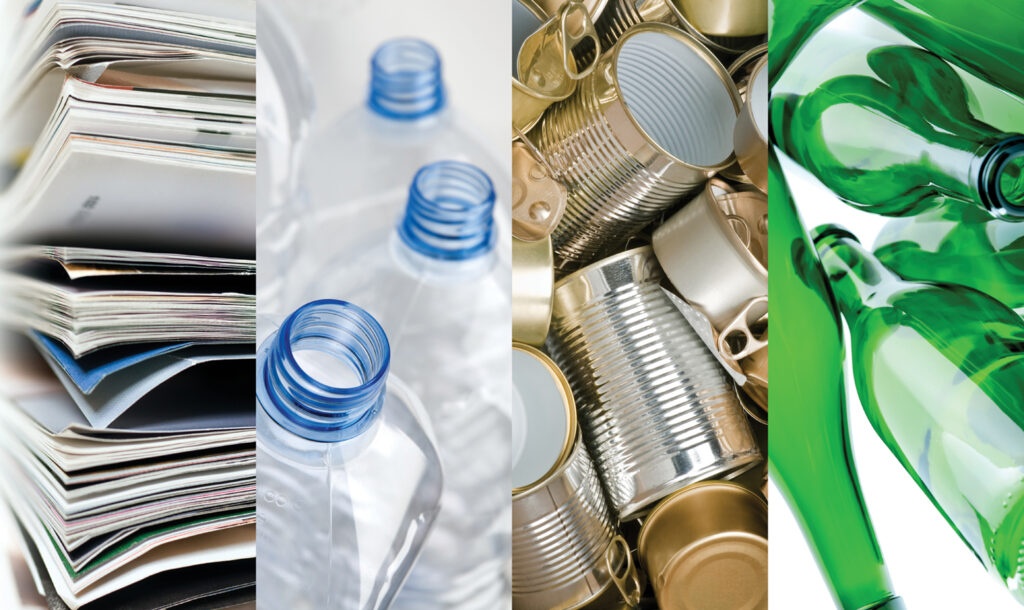
What goes in the Blue Bins
It can be hard to remember what’s accepted for recycling. Here’s a rundown of what goes in municipal containers, what can be recycled elsewhere, and what is (unfortunately) just garbage.
Glass
Glass of every color is accepted locally. Bottles and jars should be rinsed and recycled without their lids. Throw away any plastic pumps. Ceramics may seem similar to glass, but they aren’t recyclable so try to find a way to reuse them.
Paper
Nearly every paper product can be recycled if it’s clean and dry. That includes copy paper, cardboard boxes, paper towel rolls, magazines and even (rinsed out) paper cartons for milk and other liquids. You can recycle the non-greasy part of pizza boxes and drop the greasy sections off for composting.
Metal
Metal is the most valuable recyclable. You can recycle cans and containers of nearly every kind, including those for soup, drinks, pet food and more. Aluminum is infinitely recyclable, and quality is not lost in the process (unlike plastic, which diminishes in quality and value and eventually becomes useless). Make sure aluminum is very clean before recycling. Most disposable pans are dishwasher safe and can be reused several times before being recycled. Aluminum foil can be washed, dried and compressed into a fist-sized ball for recycling. Aerosol cans and other pressurized containers should not be put in your municipal bin but can be recycled at UNCW. If you have large metal items, you may be able to request a pickup or sell it as scrap to a company such as Southern Metals.
Plastics
Plastics are the most confusing material to recycle. We have to pay attention to the numbers and sort accordingly. Those little triangle symbols on plastic containers were created by the plastics industry, not the recycling industry, and don’t necessarily mean something can be recycled. All curbside recycling in the Cape Fear area is ultimately taken to Sonoco, which currently processes #1 and #2 plastics. Plastic resin #3 is PVC pipe and similar materials, which are hazardous to recycle and always trash. Grocery bags and similar #4 plastic materials, called “plastic film” should be turned in only at designated receptacles, not curbside bins. As of right now, the only place in the area to recycle #5 plastics like yogurt containers and #6 plastics (polystyrene foam) is UNCW. Plastic resin code #7 is a catch-all “other” category for miscellaneous plastics that are not #s 1-6. In almost every case, #7 should go directly to the trash. However, compostable “plastic” is often labeled #7. Containers specifically labeled “compostable” may be placed in industrial compost collection bins available at UNCW, New Hanover County collection sites, and through Wilmington Compost Company.
Plastic Recycling Cheat Sheet
#1: Accepted everywhere in the Cape Fear region.
#2: Accepted everywhere in the Cape Fear region.
#3: Not recycled locally.
#4: Includes plastic film and is accepted at UNCW and most local grocery stores.
#5: Includes yogurt containers, accepted only at UNCW.
#6: Accepted only at UNCW.
#7: Not recycled locally.
Beyond the Blue Bin
What to do with all those other things
Plastic film (grocery bags and other #4 flexible plastics)
Many grocery stores have receptacles, as does UNCW’s Recycling Depot. Plastic film includes bubble mailers, zip-top bags, air pillows for shipping, six-pack rings, and similar items.
Batteries
New Hanover County collects batteries, including alkaline, zinc-carbon, zinc-air, lithium, sealed lead-acid, and any type of rechargeable for recycling at designated bins in public libraries and at the Government Center. Bins are also available at Fort Fisher Aquarium, Cape Fear Community College, UNCW, Wrightsville Beach and all other county recycling sites. Just look for the bright yellow “igloo” receptacles. Neither Brunswick nor Pender County accept batteries for recycling. Onslow County accepts batteries and other household hazardous waste at semi-annual collection events.
Household Hazardous Waste and Electronics
New Hanover County has a residential only mobile Hazardous Waste & Electronics Recycling mobile drop off waste unit called the HazWagon for residents with regularly scheduled collections at Ogden Park, Wrightsville Beach, Carolina Beach and Kure Beach. Wrightsville Beach day is Wednesday 10 a.m. until 1 p.m., with drop off in front of the old fire station opposite where the Farmers Market is held. Check the county website for your location and times. This service is restricted to county residents and is limited to ten or less electronic items.
Computers, appliances, phones and other electronics contain some hazardous materials, so they need to be disassembled for recycling. Some local governments themselves accept electronics, as do certain retailers like Best Buy. Wilmington offers free electronics pickup to waste collection customers; just call before your regular pickup day. UNCW also accepts electronics, including cords and string lights, at its recycling depot. The general rule for electronics recyclers is, “If it has an electrical cord or runs off batteries, we’ll take it.”
New Hanover residents can take household hazardous waste and electronics to the permanent facility located at 3002 US Highway 421 North.
Many of us know the three R’s: Reduce, Reuse, Recycle but there are more!
Refuse: Say “no thanks” to bags, straws and other convenience items you don’t need.
Reduce: Don’t feel it’s hopeless if you can’t completely eliminate waste from your life. Reducing is an improvement!
Reuse: If you already have something, use it as many times as you can before recycling or trashing it.
Repurpose: Get creative. Turn an old tote into a shopping bag. Wrap a gift in a pretty scarf you don’t wear. Store leftovers in empty sauce jars.
Repair: Fixing things is making a comeback! From shoe resoling to phone repair, if you can’t do it yourself, there’s probably a local business that can help.
Regift: If you’ve got something sitting around that you can’t use, why not pass it on to someone who can: neighbors, friends, Buy Nothing groups, and charity thrift stores.
Resell: From scrap metal to vintage sneakers, you’d be surprised what “trash” has some value if you put in the effort to sell it.
Rot: This just means compost, but we had to make it an R, right?
Recycle: If you’ve exhausted all those other options, please do recycle.
UNCW Recycling Depot
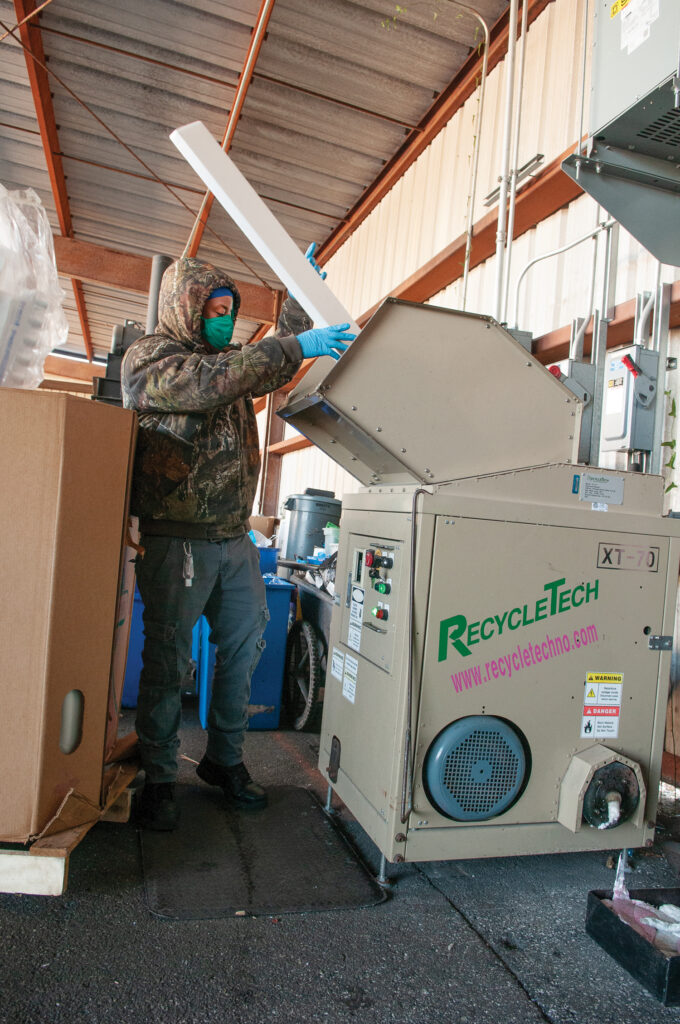
Located at 5179 Lionfish Drive, where Lionfish Drive intersects Plyler Drive is open to the public from dawn to dusk.UNCW hand-sorts all recyclables that come through the Depot so they can collect a wider variety of items, diverting 458 tons of recyclables from landfills in the 2019-2020 school year.
Empty and rinse your containers.
Metals
- Aluminum
- Tin/Steel
- Aerosol Cans
Glass
- Bottles
- Jars
- Plastics
While you should keep #5 plastics out of your city or county collection bins, the team at UNCW will be happy to see them!
Plastics
Accepted
- Bottles
- Beverage Jugs
- Tub (Remove cling film from tubs.)
- Egg Cartons
- Berry Boxes
- Meat Trays
- Liquid Soap Bottles (Remove pump from soap bottles.)
Hard/Rigid Plastic
Accepted
- 5 Gallon Buckets
- Toys
- Storage Totes
- Playsets
- Laundry Baskets
- Beach Toys
- Planters
- Tupperware
Plastic Film
Plastic film should be clean and bagged together, ideally in an accepted plastic film.
Accepted
- Grocery Bags
- Zip-top Bags
- Garbage Bags
- Bubble Wrap
- Air Pillows
- Shipping Envelopes
- Produce Bags
- Dry Cleaning Bags
- Product Wrap
- Six-pack Rings
Plastics Not Accepted
- Straws
- Chip Bags
- Snack Wrappers
- Candy Wrappers
- Compostable Cups
- Plastic Cutlery
- Frozen Food Bags
- Compostable Food Containers
- Personal Hygiene Products
- Rubber Gloves
- Compostable Bags
- Salad Bags
Paper
No paper clips or binder clips.
Accepted
- Copy Paper
- File Folders
- Envelopes
- Paperboard
- Egg Cartons
- Paper Rolls
- Books
- Notebook Paper
- Notebooks
- Magazines
- Newspaper
- Greeting Cards
- Paper Bags
- Catalogues
- Post-Its (Remove from other paper.)
- Shredded Paper (Bag your shred separately.)
Not accepted
- Paper Towels
- Tissues/Kleenex
- Paper Plates
- Coffee Cups
- Chip Bags
- Compostable Food Boxes
- Paper Cups
- Sticker Paper
- Candy Wrappers
- Snack Wrappers
- Paper Bubble Mailers
Cardboard
Cardboard should be flattened.
Accepted
- Corrugated Cardboard
- Cardboard Boxes
- Pizza Boxes (food and grease-free)
- Shoeboxes
- Tubes
- Bulk Food Boxes
Not accepted
Contaminated Cardboard:
- wet
- food-covered
- grease-soaked
- waxed
Styrofoam (EPS)
Food containers should be clean and dry. Remove all stickers and tape.
Accepted
- Packing Blocks
- Coolers
- Craft Sheets
- To-Go Food Containers
- Cups
- Egg Cartons
- Meat Trays
- Peanuts
Not accepted
- Pool Noodles
- Foam Play Mats
- Sports Fingers
- Bendable Packaging (extruded)
- Construction Foam
- Molded Film Wrapped Foam
- Biodegradable Peanuts (Always bag peanuts separately.)
- Foam Film Packaging (extruded)
Unique & Unusual
Accepted
Electronics
Anything with a Cord:
- Computers
- Monitors
- Lamps
- Fans
- Stereos
- Cell Phones
Batteries
- Alkaline
- Lithium
- Car Batteries
- Boat Batteries
- Rechargeable
Tanglers
- Hoses
- String Lights
- Hangers
- Extension Cords
